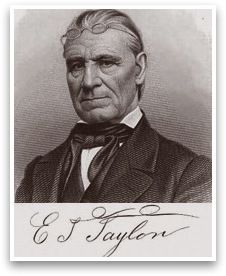
Edward Taylor
Edward Taylor, the great American metaphysical poet, was born in 1642 to Nonconformist parents. His father was a farmer, and the provincial farming dialect was forever a subtle component of his poetry. Refusing to sign the oath of Loyalty to the Church of England in 1668, he sailed for America. Initially a teacher, Taylor enrolled at Harvard to prepare himself for the ministry. He worked as a minster to a small farming community in Westfield, MA. As the owner of a vast library, Taylor worked not only as a minister but also as a teacher and physician.
His poetry was not discovered until the early twentieth century. Replete with wordplay such as puns and paradoxes, Taylor's poetry predominately focuses upon the rich varieties of the grace and mercy of God, particularly as revealed through the Eucharist.

Themes and Facts
- Known as the “American metaphysical poet” in the tradition of George Herbert and John Donne.
- Experimented with a wide variety of poetic styles.
- Relied upon “simple” metaphors of farming and housekeeping (e.g. “Huswifery”).
- Continually focused upon the grace and beauty of God.
- Limitations of poetry (c/w Bradstreet).
Study Questions
- What is the significance of Taylor entitling his group of poems "Preparatory Meditations"? For what does he need to prepare?
- How does Taylor compare to Bradstreet in his understanding of the relationship between earthly life and the spiritual realm?
- Where do you see specific elements of Calvinism/Puritan Theology in Taylor's poetry?
The magnificent beauty of Edward Taylor's poetry dispels the notion that Puritans were a joyless lot who viewed God only in stern, unforgiving terms.